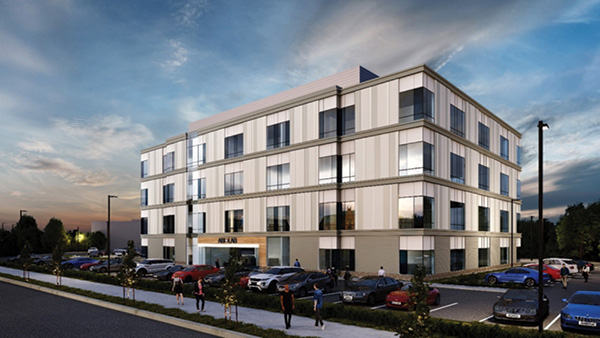
Natick, MA Innovative design transforms buildings into working habitats. While some view it as a physical manifestation of their culture or product, others directly attribute their employee productivity to intelligent design. Regardless of viewpoints, lying at the cynosure of design today is a prioritization of core values – a productive work environment, technical excellence, responsivity, a creative atmosphere and quality output. Incubators occupy a distinct position within the architectural landscape as ecosystems fostering a variety of disciplines, supporting various stages of development and abetting diverse needs. As such, their design necessitates a bespoke approach in both ideation and tactical execution - in the narrative of early stage brands details matter.
Dr. Raphael Nir and Gary Kaufman understood this principle when they created ABI-LAB, an accelerator and bio-incubator in Natick. “The start-up mindset is about exploration, experimentation, rapid learnings and failures. This project isn’t about creating a building. It is centered on the process - about fueling the genesis for productive growth and as such requires considerable upfront ideation to generate unique design features,” said Gary Kaufman, managing partner. With their 2016 building currently at waiting list capacity, they broke ground on ABI-LAB2, a 68,000 s/f bio-incubator on November 14th. Working with the Natick based design/build firm Dacon Corporation with financing provided by East Boston Savings Bank, this new facility will house up to 45 biotechnology start-ups with build-to-suit dedicated laboratories ranging from 800-2,000 s/f.
From a marketing and business development perspective, part of a well-planned strategy for entrepreneurial companies is properly configured space to accelerate growth. David Cohen Pratt of HC Atlantic Development is joint owner who shares Kaufman and Nir’s vision “In designing ABI-LAB2 we realize that strategizing for design is something not all early stage companies consider. Design – particularly for biotech start-ups – is not just an issue of aesthetics but essential form and function. Our goal is to create a core infrastructure servicing all operational needs so that start-ups can focus on research in an environment conducive to growth.” Incubators offer flexible lab conditions and leases giving start-ups relief from the substantial effort needed to create a productive work environment. “The design needs of incubator facilities are often anomalous in terms of structure, footprint and equipment accommodations. From individual labs to communal spaces, a variety of design elements are in play. Additionally, commercial land space in the MetroWest area can be compromised by unusual lot sizes, utility poles or natural features,” said Dennis McCarthy, director of design at Dacon. ABI-LAB2 will be on a 75,500 s/f lot located at 22 Strathmore Rd. in the MetroWest life science hot spot. With tight footprint being a key issue, Dacon designed a four level, 80 foot wide building that allows for maximum floorplate and design flexibility.
In addition to lot size, power is an influential factor in structural design for bio-incubators. Refrigerators, freezers, fume hoods, generators and state-of-the-art HVAC systems necessitate power at more than double the level of a traditional office building. Vibrations resulting from the equipment on the roof diaphragm and building columns most strongly affect the top floor, “It was obvious from the outset that we needed a cost-effective model for this innovative equipment,” said McCarthy. “In anticipation of demand we have large utility plenums between floors and easy access to common vertical utility shafts that will accommodate labs with growing HVAC and equipment requirements.”
Amongst other critical design features of structure, color, materials and spatial order, light acts as a perceptive, cultural and aesthetic element. However within laboratories it can be discredited, taking secondary consideration to valuable wall bench and equipment space. To address this, ABI-LAB2 will have nine foot ceiling heights with six foot punch windows enabling bench space efficiency yet allowing for maximum levels of natural light for a well-conditioned environment. Another cultural element is the conscious design of shared areas, of which ABI-LAB2 will have for both work and social purposes. “It is about creating environments that foster start-ups’ developmental approaches, whether the need is shared high-tech lab equipment for those who are in early stages of funding or common social areas where mentoring occurs. ABI-LAB2 is not simply about leasing space. Start-ups’ needs are much greater than that,” said Dr. Nir.
While architectural design and practicality may seem contradictory, within incubator facilities they become symbiotic with proper preplanning. Functionality, safety, productivity and aesthetics are all vital components for start-up success. A well designed incubator can both anticipate and solve these issues, fueling rapid scaling for an optimum work environment.
Project team includes:
• Dacon Corp., design/builder;
• East Boston Savings Bank, financing
• GZA geotechnical, engineering
• Rivers Electrical Corp., electrical
• RRC Engineering, structural engineer








.png)